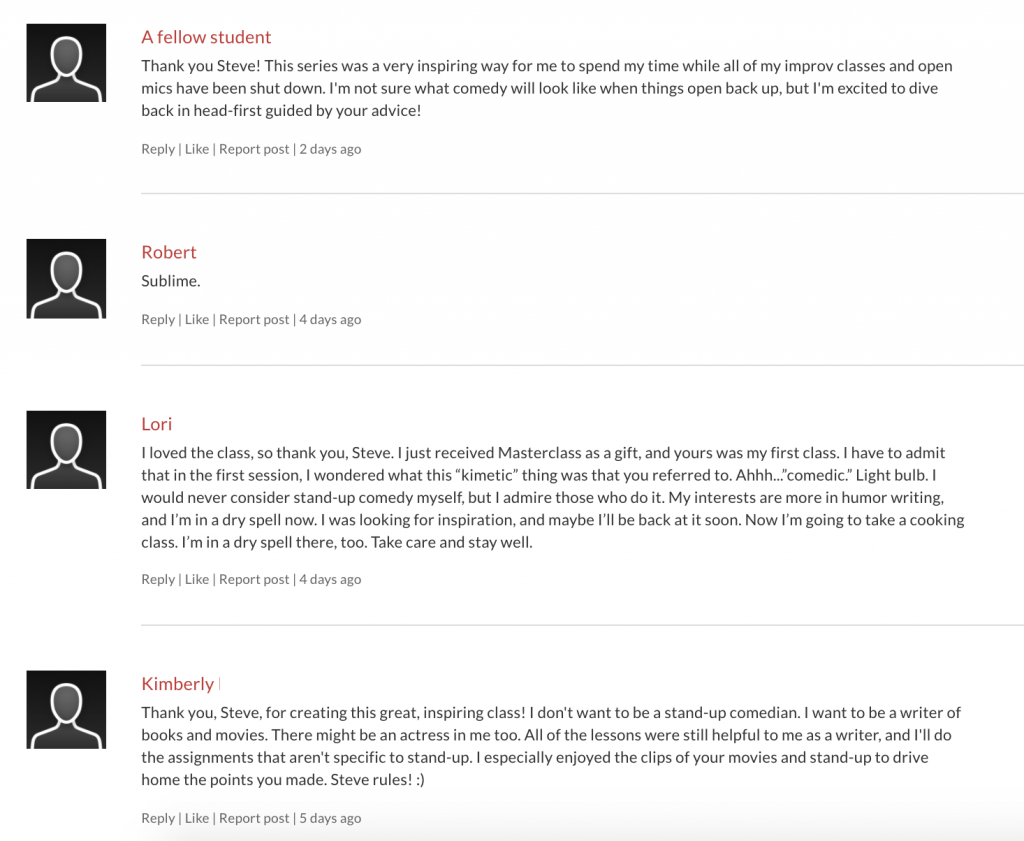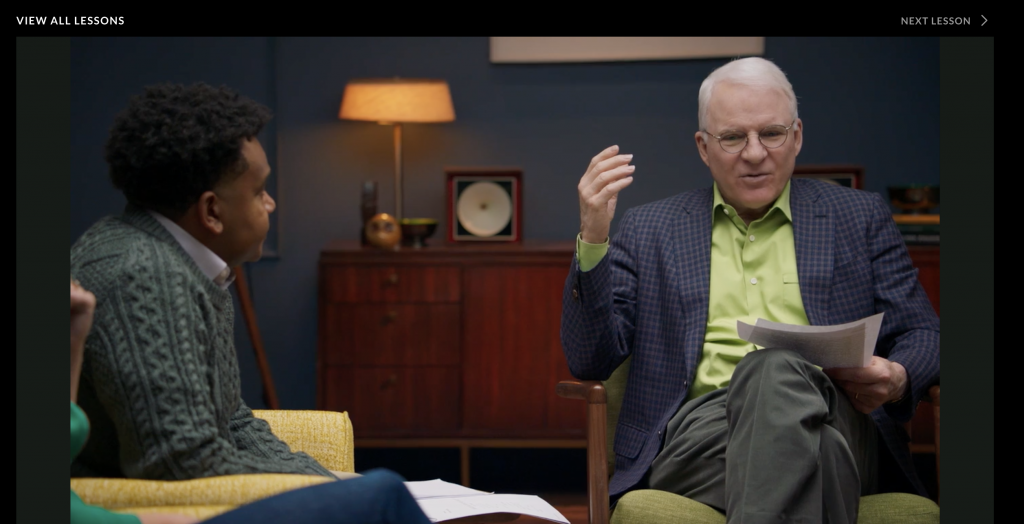In this review, we’ll see if the Steve Martin MasterClass on comedy lives up to its promises and delivers a course worthy of your investment.
“I guarantee you,” Martin begins in the course trailer, “I had no talent. None. Remember, you are a thought machine, everything you see, hear, experience is usable.”
These initial words of encouragement were comforting for someone like me with zero experience in comedy. Before starting the MasterClass, I was eager to see if Martin could take someone like me – who is introverted and bland in real life – and teach him how to be funny.
However, I went into the Steve Martin MasterClass with realistic expectations. I knew I wouldn’t become a comedic master after watching a comedian talk for two hours. What I wanted to know was:
Is paying for access to Steve Martin’s MasterClass on comedy worth it? Will I learn enough to be able to get started in comedy? Will I come away from this MasterClass funnier than before?
This review will answer all those questions and more! But first, let’s talk a little about the King Tut himself.
Table of Contents

About Steve Martin
Steve Martin has worked in comedy as a stand-up, writer, and actor over the past 50 years. Some of his most notable work includes frequent appearances on The Tonight Show Starring Johnny Carson and Saturday Night Live as well as starring in films such as The Pink Panther, Father of the Bride, and Dirty Rotten Scoundrels.
As a stand-up, Martin drew rock concert-like crowds to his shows, often selling out entire arenas.
Martin is also a notable musician. He plays the banjo in many of his acts and even appeared in Sgt. Pepper’s Lonely Hearts Club Band the film.
Some fun facts about Steve Martin:
- His first job was at Disneyland where he sold guidebooks and later worked in the Magic Shop where he acquired a taste for performance
- He popularized what is now known as “Air Quotes” while overly using them on SNL
- Martin is an avid art collector
“Some people have a way with words, and other people…oh, uh, not have way.”
Steve Martin
What does this MasterClass promise?
With Martin’s comedic pedigree, I went into this course with high expectations. But I also knew that just because someone is talented, doesn’t mean they’re a good teacher. So I was eager to see what’d I’d get from the class.
Martin makes some big promises off the start. He promises to share his specific process and how to perform comedy. He also promises to cover comedic writing and editing which he says “is one of your most powerful tools.”
After reading through the curriculum, I readjusted my expectations, realizing that the art of comedy cannot be taught in one course. And as Martin would later explain in the class, it takes practice and experience. Nevertheless, I felt good going in, knowing I was about to learn from a master.
So, did Martin live up to his promises? Did he meet my expectations? I’ll cover that at the end of the review (skip ahead if you want to find out). But first, let’s talk about what’s probably on your mind:
How much does Steve Martin’s MasterClass cost?
If you want to take Steve Martin’s MasterClass, you have three options to choose from.
In 2021, MasterClass began testing alternative subscription models besides their original flat-rate annual membership. Eventually, they settled on a new cost-friendly three-tier MasterClass pricing model for their annual subscription:
- Individual – $120 per year (average $10 per month)
- Duo – $180 per year (average $15 per month)
- Family – $240 per year (average $20 per month)

The Individual membership (formerly the “Standard Plan”) is perfect for single individuals who are most likely to consume online learning at home. The Duo (formerly the “Plus Plan”) and Family (formerly the “Premium Plan”) plans are better for couples as MasterClass allows multiple devices to watch at the same time. (Netflix has similar restrictions for their membership plans).
However, the ability to download video lessons for offline viewing is helpful for people who might want to watch MasterClass on their commute to work without eating up most of their data. The Plus and Premium plans offer their users the ability to do just that.
Personally, I go for the $120 per year option as I average about one MasterClass per month, which means my cost per class is $10.
The price may seem steep, however, the subscription gives you access to all 90+ MasterClass courses, including other comedic gurus such as Judd Apatow, Ron Howard, and David Sedaris.
Plus, you have to remember that each MasterClass is someone’s lifetime of work distilled into well-organized and enjoyable video content. In other words, if it turns out the Steve Martin MasterClass isn’t for you, chances are you’ll find other MasterClasses you do enjoy.
Steve Martin MasterClass Stats
Here’s a rundown of what you are getting with the Steve Martin MasterClass.
| Runtime: | 2 Hours 11 minutes |
| Reviews: | 4.7 out of 5 ⭐️ |
| Lessons: | 12 video lessons |
| Materials: | • 1 workbook • 2 sample scripts |
The runtime clocks in at just over 2 hours, which I thought was a little brief compared to some other MasterClasses I’ve taken before, but brevity is the soul of wit, so they say. I preferred watching the course at 1.5x speed which means I finished the entire video course in about 1 and a half hours.
The reviews on MasterClass give the course a 4.7 out of 5 stars. I dug around to see if I could find actual reviews, but MasterClass doesn’t publish those publicly. Instead, I found the following recent comments after the final lesson:

Old reviews online of Steve Martin’s MasterClass state that the course is 25 lessons long, however, the course now stands at 12 lessons long, with each lesson comprised of roughly 3-5 subsections.
Martin also provides three downloadable PDFs for students. One is a 39-page course workbook with assignments and supplemental material. Another is a short 8-page script provided for students to follow along within the MasterClass. And finally, an original 158-page script for the film Roxanne (1987).

About the structure of the class
Steve Martin’s MasterClass on comedy is divided up into 12 lessons with an average run time of approximately 11 minutes per lesson. However, the video playback buttons offer you the ability to watch the course at 1.5x and 2x speed.
Lesson plan:
- Introduction
- Gathering Material
- Finding Your Comedic Voice
- Developing a Comedic Persona
- Jokes and Bits
- Delivery
- Crafting Your Act
- Opening and Closing Your Act
- Growing as a Performer
- Nerves, Hecklers, and Bombing
- A Life In the Arts
- Final Thoughts
Martin kicks off the course explaining various ways to find material for your comedy. His premise is simple: use everyday life, observe what’s around you, and be interested in a lot of things.
He then dives into how to find your comedic voice and not become some derivative of another comedian. Martin recommends having a manifesto. He also suggests understanding that people are interested in what you think. That’s the hallmark of a comedian.
Martin covers how to develop a comedic persona, which he sums up perfectly as: create an artistic version of yourself. He doesn’t like people who say “Just be yourself” because who really knows who you are. Instead, he says “You can be who you choose to be.”
Things really pick up in Lesson 5 when Marin breaks down jokes and what makes them funny.
Martin emphasizes more than once the importance of performing and writing comedy constantly. He says this is the only way we can learn from our mistakes, grow our confidence, and understand ourselves as comedians.
Key Things I Learned
“As soon as you start talking about comedy, it’s dead.”
It’s clear that Martin is an incredibly intelligent man. Throughout the MasterClass, Martin quotes poets, comedians, essayists, and people from various backgrounds to demonstrate his vast knowledge on his craft.
At one point he quotes E.E. Cummings and it really stood out to me: “Like the burlesque comedian, I am abnormally fond of that precision which creates movement.”
This “precision creates movement” idea, Martin says, means that the cleaner and less fluff there is to your comedy, the more your act moves for the audience. When you become aware of every consonant and vowel, you hone into what’s actually funny.
What I took away from this, and the class overall, is that comedy is a craft. It’s not the same as being the funny one of your group of friends. It takes diligent effort to become good at comedy. It also made me appreciate how much Martin is devoted to his craft.
To distill everything I learned from Steve Martin would take an entire separate blog post. Instead, in the following sections, I’ll break down things I liked and things I didn’t like about the MasterClass.
Things I liked about the Steve Martin MasterClass
Martin has a very straight forward approach to teaching comedy. He doesn’t mask the comedic process behind mystique. Rather, he says things like, “Learn to observe your thoughts” and “If two people get into a fight, let them be. That’s usable material.”
I also really enjoyed at the end of each lesson a short clip played from Martin’s old routines that emphasized some aspect of the lesson. This helped reinforce his concepts about comedy.
However, my go-to lesson of this course is Lesson 5 about jokes and bits. Martin is known for not having a traditional set-up/punchline approach to comedy, and he uses this lesson to teach us how to turn some of the traditional rules upside down. I boiled down his approach to: create tension and let the audience find ways to relieve it.
Also, I can’t understate the value of the Class Workbook, which comes loaded with summaries of each lesson as well as assignments and other resources to check out. I don’t have permission to show screenshots of the workbook, but here are a few gems I enjoyed that were not in the video lessons:
- The Futurist Manifesto – I like that Steve Martin reads these kinds of things
- How to Build a Joke – By one of my favorite comedians, Demetri Martin
- 13 Major Comedy Structures – Fantastic resource
Things I didn’t like about the Steve Martin MasterClass
Martin spends a good portion of the course — at least the first four lessons — explaining the performance side of comedy (what to wear, how to find your voice, how to act on stage), which I found to be a huge assumption on his part.
I know Martin comes from a comedic performance background, however, I wish the course began with comedy basics such as what makes something funny or how a joke is made.
There are various ways to approach comedy, and being that Martin came from a specific kind, I should have expected this. I just wish some aspects of the course were more generic for a wider audience of people like myself who aren’t planning on performing anytime soon.
Another thing I enjoyed but found lacking were the student sessions. There were only 3 dispersed throughout the course and I found those to be insightful. During one student session, Martin helps a student clean up the opening to his act and I enjoyed seeing him work on the fly. Maybe the old format had more student sessions, but I wish more were added to the current course.

Finally, I was a bit confused about the two scripts included in the course. MasterClass states that I can download them and follow along, but they never come up in either the video content or the Class Workbook. Maybe they were used in the original version of the course, I don’t know.
Does the class keep its promises?
Yes, but only after re-setting my expectations. I was hoping more of a deep dive into comedy, but this MasterClass is a perfect introduction to anyone curious about getting into comedy.
Do I feel like I’m funnier now that I’ve gone through the Steve Martin MasterClass on comedy? Not exactly, but I do feel like I’d have a good idea moving forward on how to approach comedy and improve. Again, nobody will become a comedic master after watching 2 hours of a comedian talk about comedy.
However, I do believe this MasterClass on comedy is a great launching point. Also, I don’t think I’ll ever watch a stand-up routine without thinking about everything Martin taught. He was a pioneer of comedy, that part’s for sure.
Is Steve Martin’s MasterClass worth the money?
Yes if you…
- Are starting out in comedy
- Want to learn the basics and fundamentals
- Are interested in performance-based comedy (stand-up, skits, bits, etc.)
- Need an overall refresher on comedy
- Are a fan of Steve Martin and enjoy his work
No if you…
- Are a seasoned veteran of comedy
- Are looking for feedback on your work
- Want a more in-depth course on specific comedy techniques
- Aren’t a fan of Steve Martin
Conclusion
Taking everything into consideration, I highly recommend this Steve Martin MasterClass based on the following things:
- Quality of production
- Brevity of the course (Martin is not long-winded)
- The Class Workbook provided
- Steve Martin is a proven comedian with a wide range of talents
- The fact that a MasterClass pass gives me access to many, many more courses
If you’re interested in learning more, here is a trailer to the class:


